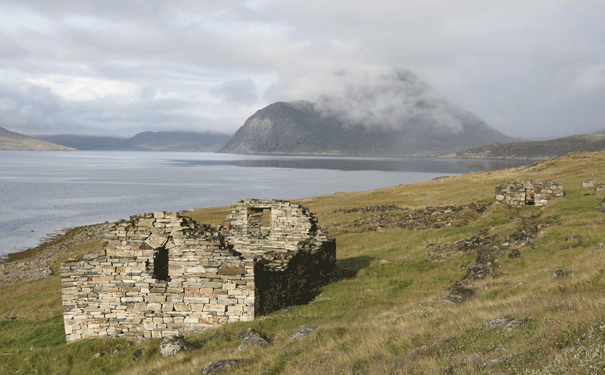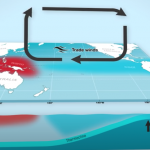
The remains of a Viking church in Greenland. Image: Shutterstock.
The Norse can teach us a lesson about failing to adapt to climate change.
Climate change isn’t a modern problem. The collapse of a Norse colony in Greenland in 1350 AD is believed to be the result of decreasing temperatures and increasing sea ice.
The researchers, led by Dr Sofia Ribeiro, from the University of Copenhagen and currently at the Geological Survey of Denmark and Greenland, focused on Disko Bay in Western Greenland.
The Vikings lived for another 400 years in Greenland, before the Western Settlement collapsed at the start of the Little Ice Age. “Our study indicates that at the time the Norse arrived in West Greenland, climate conditions were relatively mild and were favourable to the settlers. However, in AD 1350 the settlement collapsed, the cause of which has long been debated,” Ribeiro said in the press release.
The study, published in Boreas, suggests that the collapse was partially due to climate change. The researchers compared the air temperature reconstructions from a marine sediment core to ice core data and reconstructed the variations in climate for the last 1,500 years.
The results indicate that the complex climate patterns in the region are strongly influenced by the fluctuating warm Atlantic waters, entrained by the West Greenland Current.” Our study shows a major shift towards cooler conditions and extensive sea-ice which coincides with the estimated time for the collapse of the Western Settlement in AD 1350,” Ribeiro said.
And this shift didn’t help the Vikings. “The Norse were proud of being Europeans, farmers and Christians, and never adopted the hunting and survival techniques of the Inuit, so these temperature shifts would have caused significant problems for the colonists and their livestock.”
The land-based problems would have forced the Vikings to rely on the ocean for food. However, the increase in sea ice would have blocked trade routes and impacted on migratory species.
“We cannot attribute the end of the Norse civilisation to a single factor, but there is enough evidence to suggest that climate change played a major role in determining its collapse,” Ribeiro explained. “Harsh climate conditions made farming and cattle production increasingly difficult and the extensive sea-ice prevented navigation and trading with Europe.”
So what does this mean for us today? “There is perhaps an important lesson to learn from the Norse collapse and that is a lesson of adaptation, of being able to adjust our values and life-style when times change.”
Source: EurekaAlert!






